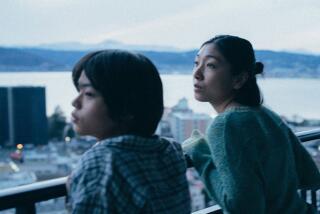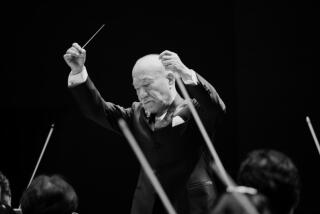Japanese director Masaki Kobayashi’s war with ‘the system’
- Share via
World War II and its aftermath loom large in the endlessly rich expanse of 20th century Japanese cinema. But no major Japanese director was as visibly affected by this defining trauma as Masaki Kobayashi (1916-96).
An art history student, Kobayashi decided to take up filmmaking when the Pacific war broke out, convinced that cinema was a more urgent medium for a time of crisis. Mere months after securing an apprenticeship at the Shochiku studio, he was conscripted into the Japanese Army in Manchuria, where, as an act of resistance, he refused to rise above the rank of private. He was eventually interned at a prisoner-of-war camp in Okinawa.
Kobayashi’s experiences in that war, which he called “the culmination of human evil,” directly inspired his grueling magnum opus “The Human Condition” (1959-61), a three-part, 9 1/2-hour epic about a principled soldier who decries but becomes implicated in his country’s militarist aggression. Now known principally for “The Human Condition” and such later period films as “Harakiri” (1963), Kobayashi was a clear-eyed social critic from early in his career. A new four-film box set from Criterion’s Eclipse series, “Masaki Kobayashi Against the System,” beautifully attests to this.
PHOTOS: Hollywood backlot moments
“The system” refers to the institutions and strictures that governed Japanese society pre- and postwar, and it applies as well to the studio that sometimes bristled at Kobayashi’s provocations. Shochiku green-lighted “The Human Condition” only after he threatened to resign. “The Thick-Walled Room” (1953), the earliest film in this set and his first overtly political work, was withheld until 1956 for fear of offending both Japanese and American authorities.
The rooms referenced by the title are the shadowy prison cells where, as an opening voice-over puts it, “Japan’s past has been entombed.” Based on the diaries of so-called B- and C-class war criminals, low-level soldiers who received the harshest punishment, the film illustrates — through flashbacks and a bit of speechifying — the chain of command and the culpability of senior officers who got off lightly.
Audie Bock’s seminal study “Japanese Film Directors” classifies Kobayashi as a “postwar humanist,” alongside his mentor Keisuke Kinoshita and Akira Kurosawa. But the anger and unmistakable political orientation of his work mark him as a clear forerunner of the New Wave directors of the 1960s, including Nagisa Oshima and Shohei Imamura.
Kobayashi’s “Black River” (1956), which traces the carnal and criminal entanglements among various characters scrounging out an existence near an American naval base, anticipates Imamura’s “Pigs and Battleships” (1962), set in a similar milieu.
PHOTOS: Behind-the-scenes Classic Hollywood
Kobayashi’s other recurring theme was the blind pursuit of money that was a byproduct of Japan’s postwar economic boom. “I Will Buy You” (1956) is a sports movie about corruption, chronicling a baseball scout’s ruthless quest to land a major league prospect. In “The Inheritance” (1962), a dying man’s wish to bequeath his riches to his illegitimate children sets off an amoral chain of events.
The Eclipse set also doubles as a mini-survey of Tatsuya Nakadai, perhaps Japan’s most revered living actor. Best known internationally for his role as the patriarch in Akira Kurosawa’s “Ran,” Nakadai was a discovery of Kobayashi’s. One of his greatest roles was as the director’s alter ego in “The Human Condition,” and he appears in all four of these films, most memorably as a swaggering young gangster in “Black River.”
In film after film, Kobayashi — without letting his characters off the hook — points the finger at a system that is rotten to the core. His particular genius was in turning this worldview into a statement of defiance and not defeat. Even when he turned his attention to Japan’s feudal past in more formally rigorous costume dramas, such as “Harakiri,” recently remade by Takashi Miike, and “Samurai Rebellion” (1967), he directed his ire at social structures that he thought oppressive and barbaric. “In any era,” as Kobayashi once put it, “I am critical of authoritarian power.”
PHOTOS AND MORE
Roger Ebert: Career in pictures
ENVELOPE: The latest awards buzz
PHOTOS: Greatest box office flops
More to Read
Only good movies
Get the Indie Focus newsletter, Mark Olsen's weekly guide to the world of cinema.
You may occasionally receive promotional content from the Los Angeles Times.










